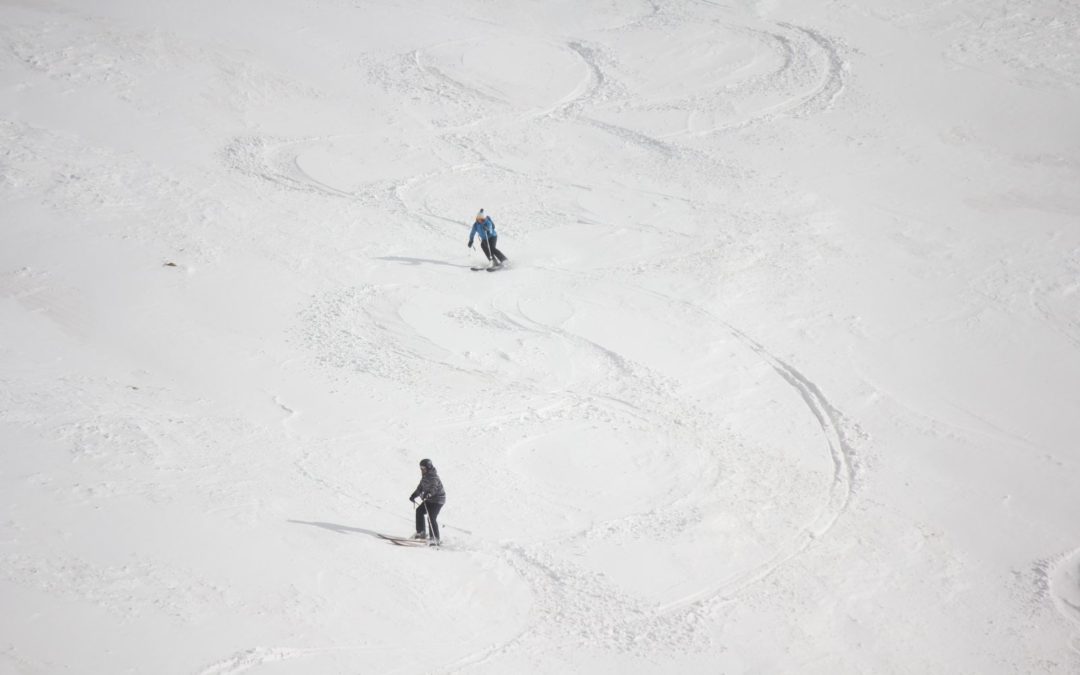It all started when I was skiing with a friend. She was watching me snowplow down a steep incline when she shouted, “You know it’s okay to be a beginner.” I will be eternally grateful to her for saying that to me. Because at that moment, I realized, I didn’t know this was okay at all.
When we are children, we are experts on being a beginner.
When we are adults, we are ashamed when we don’t feel like experts when we are learning something new. We seem to lose the ability to learn effectively. It is not easy to teach an older body new skills, just like it is not easy for adults to learn a new verbal language. Children seem to pick up new skills easily; without shame when they aren’t perfected from the get-go. Their minds are aligned with it being a new experience, rather than trying to ram some preconceived idea of “how it is supposed to be” into the reality of their process. Back to me learning to ski.
It is not an argument that I am learning to ski at not a young age.
Three years ago, I found myself living in one of the most challenging ski areas in the country, surrounded by people who are expert skiers, many who have been skiing since before they could walk, or so long they don’t remember or know what “learning to ski” means (just as we don’t remember learning to talk or walk). Upon arrival, I readied myself to learn to ski. However, what I didn’t do was allow myself to “be a beginner”. I strapped myself with the right equipment, got myself up high into the mountains, challenged myself with steeper and steeper terrain, went through some motions of “skiing” from what I observed others doing, and from others’ suggestions but… I didn’t do the most important thing when we are to learn something new–something that just comes naturally to us as children.
I hadn’t started where I began. What?
In other words, I had started where I wanted to be, not where I was when I started. Recently another friend took me out on the slopes. I had been telling her that lately, I hadn’t wanted to go out skiing and how I felt badly and confused about this. After a hot chai and an appreciative glance around the mountainscape, she said, “Today we are going to learn to turn…on flat ground”. I was confused. How is this going to help me be a better skier if I am not challenging myself with steeper angles? What is the point of skiing if I am learning on flat ground?
As we started our lesson turning the skis back and forth, I suddenly realized that because I wasn’t preoccupied with hope and fear of just making it down the hill (because it was, remember, mostly flat), I had the bandwidth to engage my mind in a way that connected what I was actually doing with my body. My mind got a chance to take the reins. Before this, my mind and body were never connected in my learning process. My mind was hopelessly abandoned as I forced my body to do what it was supposed to without allowing my brain to participate with some new knowledge and then, only then, connect and be in conversation with my body. Up until this moment, as my body attempted to turn this way, lean on my edges that way, lean forward this way, plant my poles that way, my mind was off somewhere else proverbially covering its eyes, holding its breath, and with white knuckles and between clenched teeth saying hope this works this time.
From “surviving” to feeling joy
As I inched along the mostly flat ground slowly turning this way, and then slowly turning the other way I was, as my other friend so accurately described, being a beginner! I thought “Oh this is how this works!” As we left the flat ground for the top of the mountain, not only was I able to apply what I learned on flat ground to steeper terrain, engaging my brain to communicate with my body thus shifting from “surviving” down the hill to skiing effectively down the hill, I was feeling joy!
Now, what does this have to do with anything else? I often hear in my work my clients wanting to “be somewhere they are not”. I want to be more organized. I want to eat healthier. I want to communicate better with my partner. Etc. And feel frustrated with their lack of progress or reaching these goals. Just as I wanted to be shredding down the mountain instantly after deciding to learn to ski, we often want instant results when we set any goal for ourselves. Unlike children, we have a set picture in our minds of what we are aspiring to that, unfortunately, can impede rather than inspire because of how frustrated we get that we have not reached that picture.. immediately.
It may not be as an exciting slogan but “shoot for the stars” may be better off being something like:
Grab a ladder, put your foot on the first step, and start climbing.
Start where you begin.
Be a beginner.
Thanks for showing up for yourself today and taking the time to reflect.
Subscribe to my newsletter
Each month, I share writing exercises that accompany my blog posts. To receive access to my free self-discovery worksheet, as well as past and future emails, sign up for my newsletter here.

